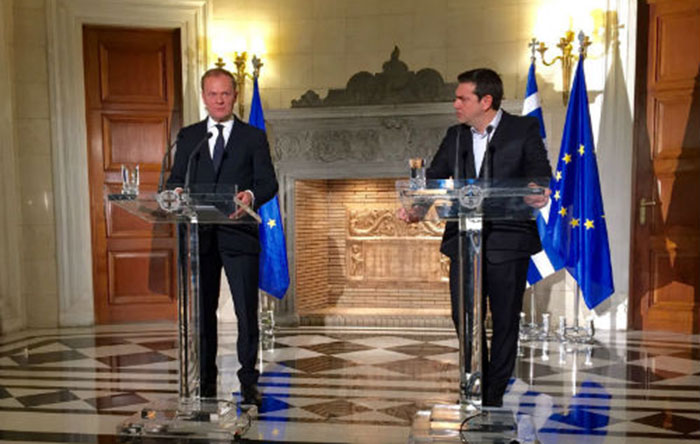Remarks by President Donald Tusk after his meeting in Athens with Prime Minister Alexis Tsipras
Kalimera. Dear Prime Minister, thank you again for welcoming me in Athens, and for the good meeting we just had.
This is the second time I am here in sixteen days. I have already visited Vienna, Ljubljana, Zagreb and Skopje, and from Athens I will go to Ankara, Istanbul and Belgrade.
The purpose of my trip is to build a European consensus on how to tackle and solve the migration crisis we are facing. Greece is among the most affected countries, in fact the most affected. Let me repeat what I said here in Athens only two weeks ago: Excluding Greece from Schengen is neither an end nor a means in this crisis. Greece is part of Schengen, of the euro area and of the European Union and will remain so.
We must build a European consensus based on our joint decisions and rules. We must avoid divisions among us, as they do not bring us any closer to a solution, but only erode trust. Unilateral decisions without prior coordination, however understandable they are in a national context, are in fact detrimental to the European spirit of solidarity.
We have to avoid an illusion that instead of the full respect for Schengen rules, there might be another, easy and convenient European solution. Respecting the Schengen rules will not solve the migration crisis. I am fully aware of this. But without it we have no chance to resolve it.
As we agreed two weeks ago, we have to end the so-called wave-through process. This is happening as we speak. And this is why, here from Athens, I want to appeal to all potential illegal economic migrants wherever you are from: Do not come to Europe. Do not believe the smugglers. Do not risk your lives and your money. It is all for nothing. Greece or any other European country will no longer be a transit country. The Schengen rules will enter into force again.
As we strengthen our external border control, we need to massively step up our support to Syrian refugees and the countries neighbouring Syria, as well as to help tackle the negative consequences in the most affected Member States, above all in Greece. This is a matter of utmost urgency. And this is why I welcome the Commission’s announcement yesterday of a new Emergency Assistance Instruments of 700 million euro for EU Member States, and in particular Greece, that are facing an extraordinary humanitarian crisis.
As I have just seen with my own eyes, the situation along the Western Balkan route is really dramatic, and so we must act with determination to improve it. At the moment, Greece is the main entry point of migrants into the European Union. And so, it is here that the situation is much more complex and complicated, with a continuous flow of migrants and refugees arriving via Turkey every day, and with many thousands stranded in Greece.
That is also why I will immediately travel to Turkey from here. Our joint action plan with Turkey is and will remain a priority. We must do everything we can for it to succeed. This ultimately means that the high numbers we are still witnessing have to go down, and quickly so. In concrete terms, it also means that we have to step up the returns of irregular migrants arriving to Greece from Turkey. That is a priority. The readmission of more than 300 yesterday is a good sign.
Prime Minister Tsipras, let me conclude by thanking you again for our meeting here in Athens, as well as for your constructive approach and efforts. Greece and the Greek people are paying a very high price for the problem they themselves did not create. I want to state here very clearly that the European Union will not leave Greece alone. Efcharistó polý.



